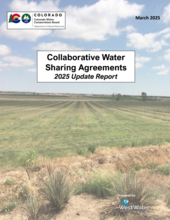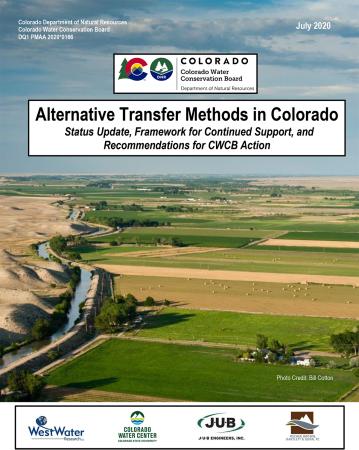Collaborative Water Sharing Agreements
Collaborative water sharing agreements include a variety of approaches such as option agreements and short-term leases to meet various water supply needs in ways that minimize permanent reductions in irrigated agriculture and associated socio-economic and ecological externalities. They can be used to meet a variety of water supply needs including drought recovery, environmental and recreational flow, groundwater sustainability, and compact compliance.
The Colorado Water Conservation Board continues to provide both financial and technical support to encourage the development and implementation of collaborative water sharing agreements.
Please note that collaborative water sharing agreements have also been referred to as Alternative Transfer Methods (ATMs). Both terms are used in resources on this page and remain relevant guides for water sharing projects.
More more information or with questions, contact Nora Flynn.
CWSA 2025 Update Report
CWCB, in partnership with Westwater Research, completed a CWSA update report. This report includes a narrative on the evolution of terminology of CWSAs, an updated inventory of CWSAs taking place in Colorado, a discussion of how the 2023 water plan builds on the previous effort to support CWSAs, and recommendations for CWCB staff for furthering progress on CWSAs.
2020 ATM Status Report
CWCB, in partnership with WestWater Research, the Colorado Water Center at Colorado State University, and J-U-B Engineers, recently completed a status assessment of progress made on alternative transfer methods, now referred to as Collaborative Water Sharing Agreements (CWSA). The status assessment report also provides a framework for the continuing development of CWSAs in Colorado to reduce the socio-economic and environmental impacts of more traditional water transfers and to support various Colorado Water Plan goals.
- Bessemer Farmland Conservation Project - Palmer Land Conservancy
Bessemer Farmland Conservation Project - Palmer Land Conservancy
- StoryMap collection of water sharing project examples
Accommodation statement: The following Story Map titled, "CWCB Alternative Transfer Methods" may not be accessible to those using screen-reader technology. The State of Colorado is committed to providing equitable access to our services to all Coloradans. Please contact Anna Porter (anna.porter@state.co.us or 303-866-3441 x3244) for personalized accessibility assistance. We will contact you directly within three business days. Visit our accessibility webpage for more information and services, including AIRA, our free service for blind and low-vision users.

